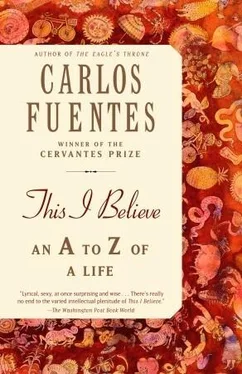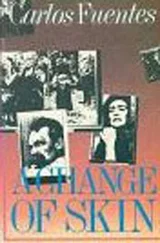Carlos Fuentes
This I Believe: An A to Z of a Life
To the memory of my beloved son
CARLOS FUENTES LEMUS (1973–1999)
In Yucatán, you never see the water. It flows underground, beneath a fragile sheath of earth and limestone. Occasionally, that delicate Yucatec skin blossoms in eyes of water, in liquid ponds— the cenotes— that attest to the existence of a mysterious subterranean current. For me, love is like those hidden rivers and unexpected streams of Yucatán. On occasion our lives come to resemble those infinite chasms that would be fathomless if we did not find, at the very bottom of the void, a flowing river, at times placid and navigable, wide or narrow, at times steep, but always a liquid embrace that helps keep us from disappearing forever into the deep gulf of nothingness. While love may be that river that flows and sustains life, love and its most treasured qualities— goodness, beauty, affection, solidarity, memory, companionship, desire, passion, intimacy, generosity, and the very will to love and be loved — are still not necessarily free of the one thing that seems to negate love: evil.
In political life, it is possible to convince oneself that one is acting out of love for a community while driving that community into destruction and inspiring hatred from both within and without. I do not doubt, for example, that Hitler loved Germany. But in Mein Kampf, he made it clear that the notion of loving his country was inseparable from the hatred of all those things that he perceived to be at odds with Germany. The kind of love that is cultivated out of hatred for others was made explicit in a regime of evil that has no parallel in all of history. From the beginning, Hitler declared that he would practice an evil brand of politics in order to achieve good. He made no attempt to hide this, unlike Stalin, who wrapped himself in a flag of humanistic Western ideology — Marxism — to perpetrate an evil comparable to that of Hitler, but that did not dare utter its name. Hitler’s love of evil led him to a Wagnerian apocalypse against the backdrop of a Berlin in flames. Stalin’s love of evil was translated into the slow collapse of a Kremlin built of sand, washed away by the waves, slow but constant, of the same history that the Dictatorship of the Proletariat hoped to embody. The Nazi regime collapsed like a horrid, wounded dragon. Soviet Communism dragged itself to the grave like a sickly worm. Fafner and Oblomov.
The Marquis de Sade also proposes a love of evil that seeks carnal pleasure as a way of grounding the body’s pain and its subsequent disappearance from earth. Sadistic love, the Marquis tells us, may be a bad thing for the victim, but represents a supreme good for the executioner. De Sade, however, did not intend actually to put his monstrous evil-as-good vision into practice. He was not a politician; he was a writer who was almost continuously locked up in prison and thus incapable of acting except in the kingdom of fantasy. There, he was the monarch of creation. And he warns us: “I am a libertine, but I am neither a delinquent nor an assassin.”
There is another covert form of evil that presents itself as love. This consists of imposing our will upon another person “for his own good”—that is, for the love of someone whom we rob of his liberty in the name of love, effectively leading him away from the path of his own destiny. This is one of the eternal themes of literature, and for me, the person who captures it with the utmost clarity is one of the great authors who blazed through my youth, François Mauriac.
Thérèse Desqueyroux, Le Désert de l’amour, Le Næud de vipères, Le Baiser au lépreux, and Le Mal itself are all novels about a perverted evil that, intending to do good, either destroys or debases the ability to love through the manipulation of religion, money, and, above all, social convention and hypocrisy. Thérèse Desqueyroux, at the height of this drama about good intentions paving the way to hell, kills in the name of an old offense, and at the price of her own health, in order to save family face. Society, family, and honor thus determine, in the name of love owed to those institutions, the heroine’s erotic slavery and crime of passion.
The praise of love as the supreme reality or aspiration of human beings cannot and should not overlook the fraternity of evil even though, in essence, love overcomes evil in the majority of cases. It can crush it, but it will never vanquish it fully. Love needs a cloud of doubt to hover above, against the evil that preys upon it. Inevitably, though, the cloud and the rage of the heavens will dissolve into pleasure, tenderness, sometimes even blind passion or the fleeting happiness of love as men and women experience it. The most ardent romantic passion can languish and fall into habit or irritation with the passage of time. A couple begin to know each other because, first and foremost, they know so little of each other. Everything is surprise. When there are no surprises left, love can die. Sometimes love yearns to recover the wonder of its earliest moments but inevitably comes to realize that the second time around the wonder is nothing more than nostalgia. Some people perceive the notion of habit as a terrible burden — a conclusive, repetitive, tedious desert whose only oasis is death, television, or separate bedrooms. But then again, aren’t there also many couples who have discovered, through habit, the truest and most lasting form of love, the love that is best able to welcome and protect the companionship and support that also signify love? And doesn’t another kind of desert exist as well, one that is fiery by day but frozen by night? I mean the desert of endless passion, so excruciating that the great protagonists of romantic love have preferred premature, passionate death at the very height of the love experience to the slow loss of passion through the monotony of day-to-day life. Can Romeo and Juliet grow old together? Maybe. But young Werther cannot end his days watching Big Brother on television as his only form of vicarious participation in passions less lethargic than his own.
Love wishes to be, for as long as possible, the pinnacle of pleasure: desire blossoming from inside and extending out to the hands, the fingers, the thighs, the waist, the open flesh; caresses and an anxious pulse; the universe of love-blessed skin, the lovers reduced to the discovery of the world; voices that speak in silence; the interior baptism of all things. It is when we think of nothing at all so that this moment will never end. Or when we think of everything possible, precisely so as not to think of this and give the pleasures of the flesh their freedom and their longest brevity; when we concede that St. Augustine was right, and yes, love is more bestiarum (in the manner of animals) but with one difference: human beings are the only animals that make love face to face (complications notwithstanding, of course). For the animal, there are no exceptions. For us, the animal exception is the human rule.
When is the felicity of love greatest? In the act of love or in the leap forward in the imagination of what the subsequent lovers’ union will be like? The exhausted joy of memory and then, once again, abundant desire, enhanced by love, a new act of love: is this felicity? The pleasure of love leaves us stunned. How is it possible that the entire being, without any kind of waste or abandon, can lose itself in the flesh and the gaze of the beloved, and at the same time lose all notion of the exterior world? How is this possible? How can one pay for this love, this pleasure, this illusion?
The prices that the world exacts for love are many. But, just as in the theater or the sports arena, there are various entrance prices and even preferred seating.
Читать дальше












